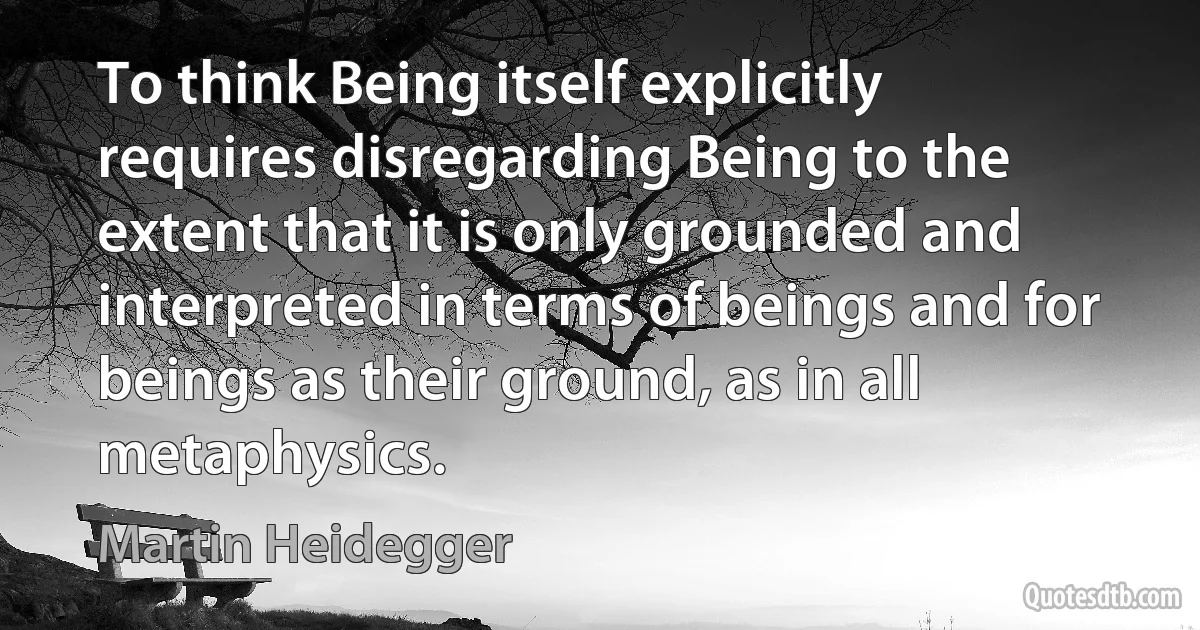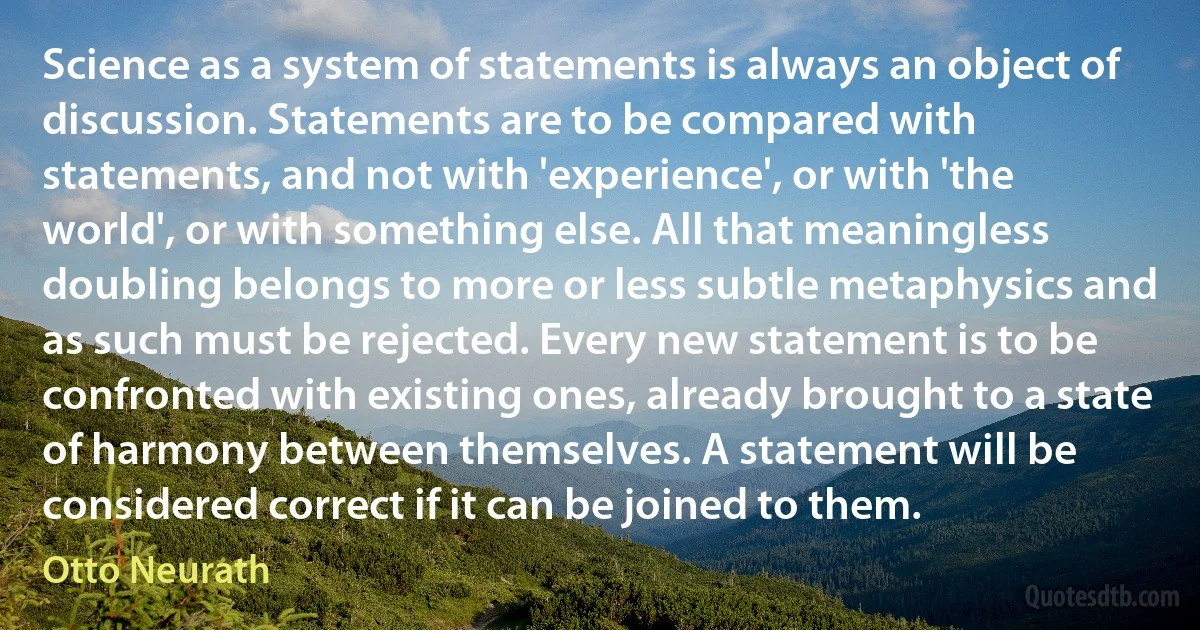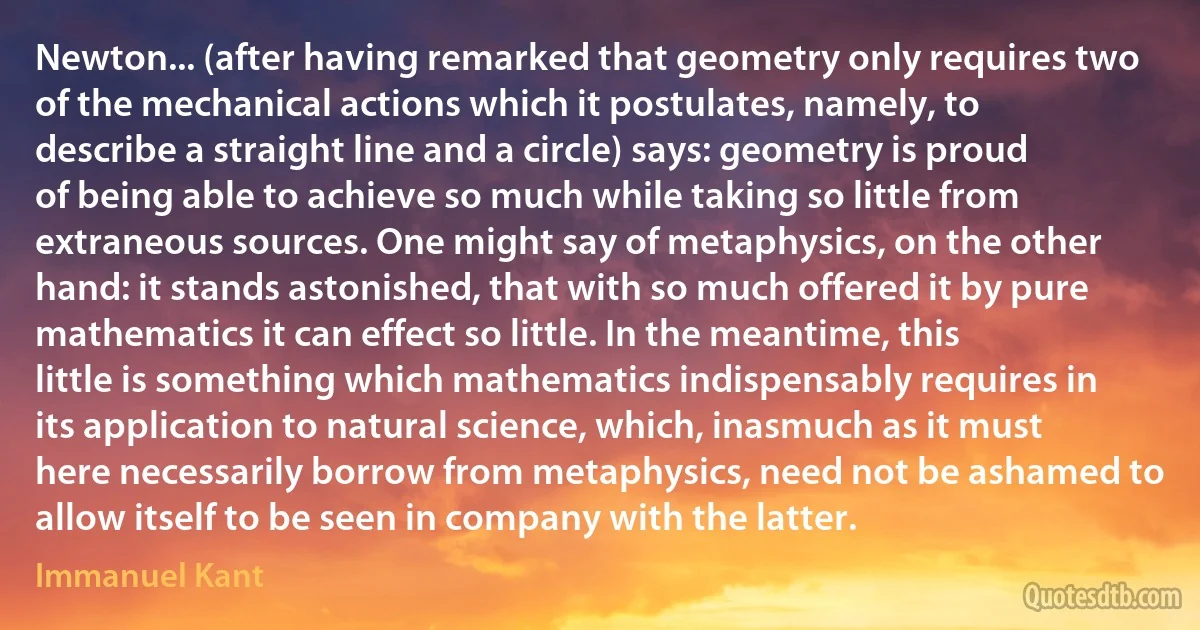Metaphysics Quotes - page 4
There are two suffixes in our language (and similar ones in other European languages) which suggest organized knowledge. One is the venerable, academic "ology," that reminds one of university curricula and scholarship. The other is the energetic and somewhat mysterious "ics," which has a connotative flavor of magic. Where "ology" suggests academic isolation (ichthyology, philology) "ics" suggests a method of attack on life's problems. It contains a faint throwback to the ancient dreams of the philosopher's stone and of "keys" to the riddles of the universe. Ancient words ending in "ics" are mathematics and metaphysics. Of more recent origin are economics, statistics, semantics, and cybernetics.

Anatol Rapoport
[Brandeis] did not believe with the evangelist that... truth could be found by abiding in the Word or in becoming the disciple of any leader. Neither did he think it came from intuition or from speculation in metaphysics. He thought it could and would come only from the relentless, disinterested and critical study of facts.

Louis Brandeis
The immanent purpose is an intrinsic property of living beings, without it, they would not exist. Consider the autonomous function units and their components: organs, tissues, isolated cells, as well as other properties such as nutrition, body defense, growth, reproduction, to which they are subject at the end. When it comes to these properties, biologists do not argue; but if you pronounce the word purpose, there is a public outcry. Probably because they do not distinguish the purpose of fact or immanent, the trascendental purpose. Of the latter, the biologist has little or nothing to say; it is a matter of metaphysics.

Pierre-Paul Grassé
We can begin, like the Scholastic masters, with an objection: videtur quod non ... ""It seems not to be true that..."" And this is the objection: a time like the present [i. e., a few years after the Second World War, in Germany] seems, of all times, not to be a time to speak of leisure. [...]
That is no small objection. But there is also a good answer to it. [...]
For, when we consider the foundations of Western European culture (is it, perhaps, too rash to assume that our re-building will in fact be carried out in a ""Western"" spirit? Indeed, this and no other is the very assumption that is at issue today), one of these foundations is leisure. We can read it in the first chapter of Aristotle's Metaphysics. And the very history of the meaning of the word bears a similar message. The Greek word for leisure (σχολή) is the origin of Latin scola, German Schule, English school. The names for the institutions of education and learning mean ""leisure.""

Josef Pieper
And as for the close connection between philosophy and poetry, we can refer to a little-known statement by Thomas Aquinas in his Commentary on Aristotle's Metaphysics [I, 3]: the Philosopher is akin to the Poet in this, that both are concerned with the mirandum, the "wondrous," the astonishing, or whatever calls for astonishment or wonder. This statement is not that easy to fathom, since Thomas, like Aristotle, was a very sober thinker, completely opposed to any Romantic confusion of properly distinct realms. But on the basis of their common orientation towards the "wonderful" (the mirandum - something not to be found in the world of work!) - on this basis, then, of this common transcending-power, the philosophical act is related to the "wonderful," is in fact more closely related to it than to the exact, special sciences; to this point we shall return.

Josef Pieper
According to this view, the sentences of metaphysics are pseudo-sentences which on logical analysis are proved to be either empty phrases or phrases which violate the rules of syntax. Of the so-called philosophical problems, the only questions which have any meaning are those of the logic of science. To share this view is to substitute logical syntax for philosophy.

Rudolf Carnap
The metaphysical apologia at least betrayed the injustice of the established order through the incongruence of concept and reality. The impartiality of scientific language deprived what was powerless of the strength to make itself heard and merely provided the existing order with a neutral sign for itself. Such neutrality is more metaphysical than metaphysics.

Max Horkheimer
The second doctrine of the Perennial Philosophy - that it is possible to know the Divine Ground by a direct intuition higher than discursive reasoning - is to be found in all the great religions of the world. A philosopher who is content merely to know about the ultimate Reality - theoretically and by hearsay - is compared by Buddha to a herdsman of other men's cows. Mohammed uses an even homelier barnyard metaphor. For him the philosopher who has not realized his metaphysics is just an ass bearing a load of books. Christian, Hindu, Taoist teachers wrote no less emphatically about the absurd pretensions of mere learning and analytic reasoning.

Aldous Huxley
Although what is called ‘philosophical speculation' is undoubtedly on the decline, many of the practically minded have not yet freed themselves from a method of reasoning, which, in the last analysis, has its roots in theology and metaphysics. No science which pretends to be exact can accept an untested theory or doctrine; yet even in an exact science there is often an admixture of magic, theology, and philosophy. It is one of the tasks of our time to aid scientific reasoning to attain its goal without hindrance. Whoever undertakes this is concerned not so much with ‘philosophy,' properly speaking, as with ‘anti-philosophy.' For him there is but one science with subdivisions - a unified science of sciences. We have a science that deals with rocks, another that deals with plants, a third that deals with animals, but we need a science that unites them all.

Otto Neurath
Put in a nut-shell, my thesis amounts to this. The repeated attempts made by Rudolf Carnap to show that the demarcation between science and metaphysics coincides with that between sense and nonsense have failed. The reason is that the positivistic concept of 'meaning' or 'sense' (or of verifiability, or of inductive confirmability, etc.) is inappropriate for achieving this demarcation - simply because metaphysics need not be meaningless even though it is not science. In all its variations demarcation by meaninglessness has tended to be at the same time too narrow and too wide: as against all intentions and all claims, it has tended to exclude scientific theories as meaningless, while failing to exclude even that part of metaphysics which is known as 'rational theology'.

Karl Popper
First let me persuade you of my metaphysics and epistemology, then my theory of science, then my ethics and social theory, and then having done all that, I will convince you of my political theory. Over the past two decades, I have become convinced that this is a mug's game... The reason Plato, Hobbes, Marx, Mill, and Rawls (many others could be named) garner widespread attention as political theorists has much more to do with their destinations than with their starting points.

Ian Shapiro
Intelligence has two parts, which we shall call the epistemological and the heuristic. The epistemological part is the representation of the world in such a form that the solution of problems follows from the facts expressed in the representation. The heuristic part is the mechanism that on the basis of the information solves the problem and decides what to do.
[...]
The right way to think about the general problems of metaphysics and epistemology is not to attempt to clear one's own mind of all knowledge and start with 'Cogito ergo sum' and build up from there. Instead, we propose to use all of our knowledge to construct a computer program that knows. The correctness of our philosophical system will be tested by numerous comparisons between the beliefs of the program and our own observations and knowledge.

John McCarthy (computer scientist)
All natural philosophers, who wished to proceed mathematically in their work, have hence invariably (although unknown to themselves) made use of metaphysical principles, and must make use of such, it matters not how energetically they may otherwise repudiate any claim of metaphysics on their science.

Immanuel Kant
A metaphysics of morals is therefore indispensably necessary, not merely because of a motive to speculation - for investigating the source of the practical basic principles that lie a priori in our reason - but also because morals themselves remain subject to all sorts of corruption as long as we are without that clue and supreme norm by which to appraise them correctly...

Immanuel Kant



